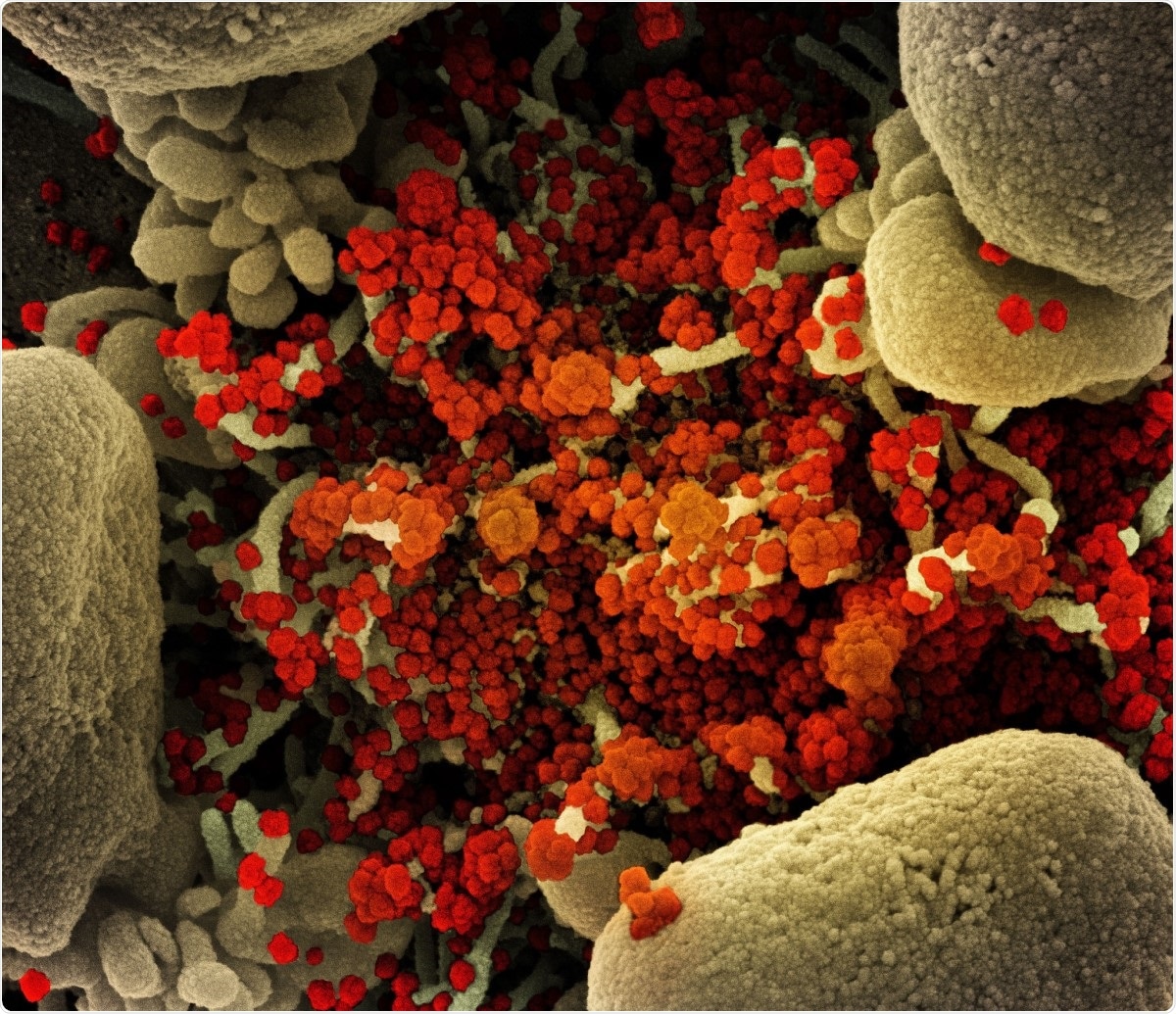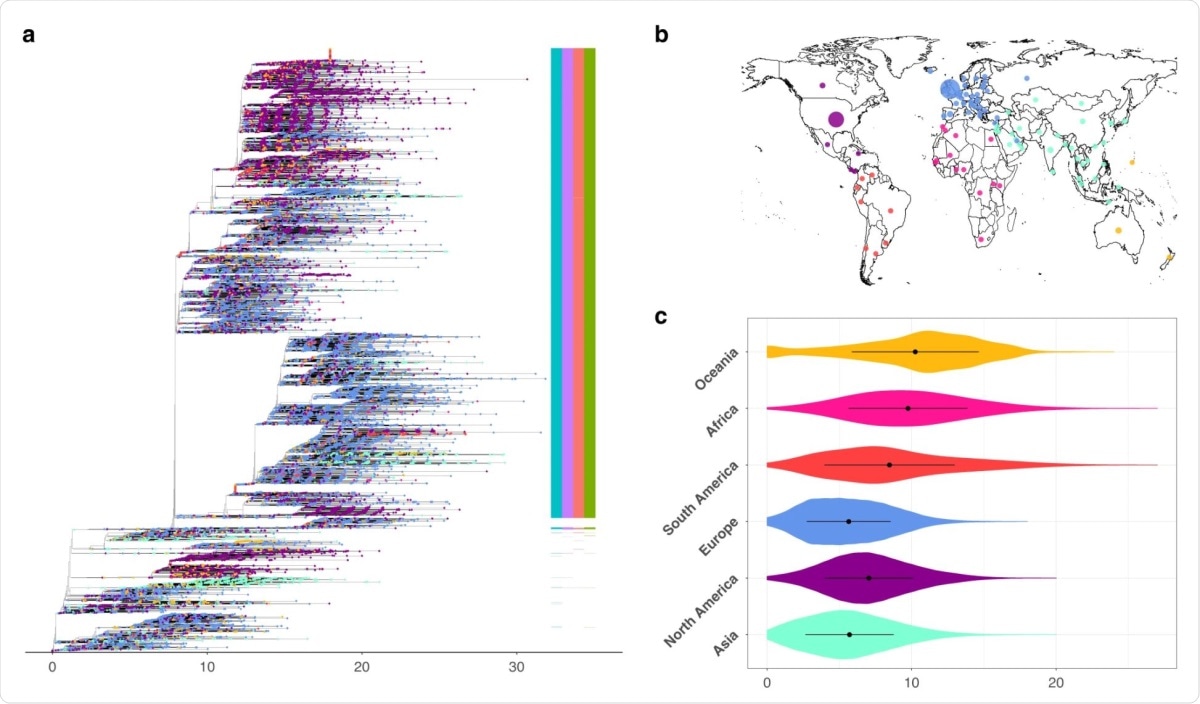The coronavirus disease 2019 (COVID-19), caused by the severe acute respiratory syndrome coronavirus 2 (SARS-CoV-2), first emerged in December 2019 in Wuhan City, China. Since then, it has spread to over 191 countries and has infected more than 60.51 million people.

Colorized scanning electron micrograph of an apoptotic cell (tan) heavily infected with SARS-CoV-2 virus particles (orange), isolated from a patient sample. Image captured at the NIAID Integrated Research Facility (IRF) in Fort Detrick, Maryland. Image Credit: NIAID / Flickr
The novel coronavirus stemmed from a still unverified animal reservoir, but is thought to have originated in horseshoe bats. Due to its recent jump to humans, SARS-CoV-2 may not be fully adapted to its human host. Scientists speculated that the virus might be mutating towards higher transmissibility.
A team of researchers at the UCL Genetics Institute, University College London, tested whether any homoplasies observed in SARS-Cov-2 to date are significantly linked to increased viral transmission.
The team found that out of over 12,000 mutations of the novel coronavirus, none has significantly heightened its infectivity.
More than 46,000 samples from 99 different countries were included in the study.
No increased transmissibility
In the study, which was published in the peer-reviewed journal Nature, the researchers developed a phylogenetic index to quantify the relative number of descendants in sister clades with or without a specific allele. They also applied the index to a curated set of recurrent mutations identified with a dataset of 46,723 SARS-CoV-2 genomes isolated from patients across the globe.

Maximum likelihood phylogeny for complete SARS-CoV-2 genomes. Tips are colored by the continental region of sampling. D614G haplotype status is annotated by the presence/absence coloured columns (positions 241, 3037, 14,408 and 23,403, respectively). b Viral assemblies available from 99 countries displayed on a world map. c Within-continent pairwise genetic distance on a random subsample of 300 assemblies from each continental region. Colors in all three panels represent continents where isolates were collected. Magenta: Africa; Turquoise: Asia; Blue: Europe; Purple: North America; Yellow: Oceania; Dark Orange: South America according to metadata annotations available on GISAID (https://www.gisaid.org) and provided in Supplementary Data 1. The map in Fig. 1b was created using the R package world map using the public domain Natural Earth data set. Image Credit: Original Article
They found that none of the recurrent SARS-CoV-2 mutations tested were tied to a significantly increased viral transmission. Instead, recurrent mutations seem to be induced by host immunity through RNA-editing mechanisms.
Further, the team revealed that a prevalent mutation, the D614G, which many researchers believed had made the virus more easily transmitted, does not appear to have affected its ability to infect people.
“The number of SARS-CoV-2 genomes being generated for scientific research is staggering. We realized early on in the pandemic that we needed new approaches to analyze enormous amounts of data in close to real-time to flag new mutations in the virus that could affect its transmission or symptom severity,” Dr. Lucy van Dorp from UCL Genetics Institute and study co-author, said.
“Fortunately, we found that none of these mutations is making COVID-19 spread more rapidly, but we need to remain vigilant and continue monitoring new mutations, particularly as vaccines get rolled out,” she added.
Monitoring of potential changes in transmissibility
The monitoring of potential changes in virus transmissibility is crucial amid the ongoing coronavirus pandemic. Studies tackling these changes can help clinicians and health experts tailor health measures to prevent virus spread.
Further, it can help shed more light on the dynamics of the virus’s spreads, potentially opening the door for vaccine and drug development.
“Our results do not point to any candidate recurrent mutation significantly increasing the transmissibility of SARS-CoV-2 at this stage and confirm that the genomic diversity of the global SARS-CoV-2 population is currently still very limited,” the researchers wrote in the paper.
However, the team emphasized that SARS-CoV-2 will mutate into different lineages as it establishes itself as an endemic human pathogen.
Like other viruses, it is expected that SARS-Cov-2 will mutate and eventually become more common in human populations. But, this does not mean that any lineage will become more transmissible and harmful.
The team also noted that SARS-CoV-2 seems well adapted to transmission among humans, and it appears that it had already reached its optimum fitness in the human host by the time it was identified as a novel virus.
COVID-19 spread
The virus continues to spread worldwide, with many countries reporting second waves of outbreaks. In the United States, despite skyrocketing cases, many businesses and schools have re-opened. The country has now passed over 12.76 million cases and more than 262,000 deaths.
India and Brazil continue to report surging numbers too, with over 9.22 million and 6.11 million cases, respectively. The United Kingdom and France report an escalating number of new cases, with more than 1.56 million and 2.22 million cases, respectively.
Globally, the virus has claimed over 1.423 million lives.
Source:
Journal reference: